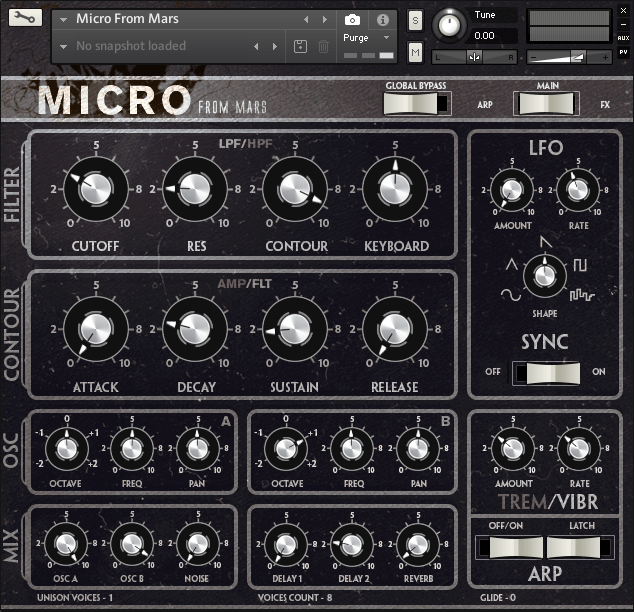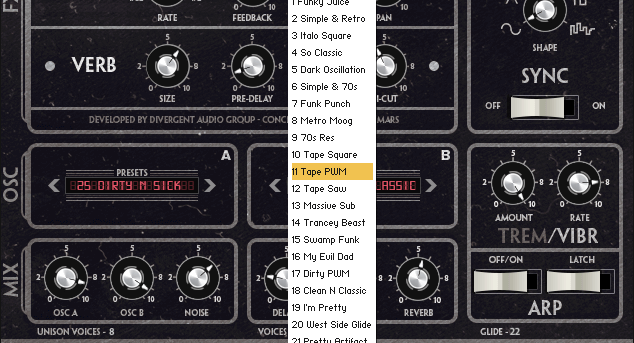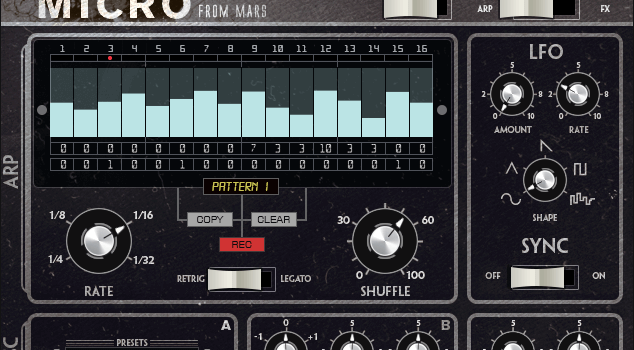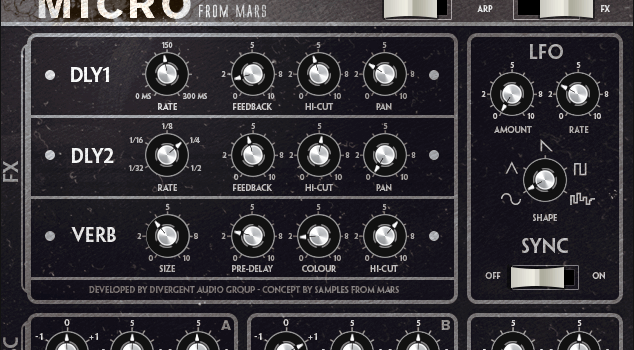Back in January, Samples From Mars released an instrument library featuring the sounds of the vintage Micromoog synthesizer.
We captured this synth at both its cleanest and dirtiest settings, recording long modulations, sweeping filters, and as many waveshapes as humanly possible.
With the help of a tape machine, various tube devices, API & Neve preamps, hardware saturation, EQ and modern moog filters, we took it out of the 70s and into new sonic territory.
Once digitized, it was further transformed into a stunning soft synth, capable of gorgeous pads, classic moog leads and basses, cosmic FX, italo arpeggiators, deep house chords and more.
The Kontakt version of Micro From Mars comes with a 3-page custom interface.
Controls are available for a hi-pass and low-pass filter, amp & filter ADSR envelopes, 2 tunable oscillators, osc & noise mix, 2 delays and a reverb effect, a syncable multi-mode LFO (filter), tremolo (volume) and vibrato (pitch), and a 16-step arpeggiator.
The interface has a nice layout and is easy to use, though some of the controls are perhaps not so intuitive. For instance the unison, voice count and glide in the bottom of the interface can be changed by click dragging up & down on them. Various sections have panel swaps by clicking the greyed out text, like LPF/HPF, AMP/FLT and TREM/VIBR.
The Micromoog is a single VCO mono synthesizer, but with this Kontakt instrument you get 2 oscillators. To select the sound source for the oscillators, you need to click the little A and B in the osc section. Note that a document with some notes and two videos are included in this product, demonstrating the “hidden” secondary parameters I just mentioned.
The heart of Micro From Mars is a collection of 30 unique hardware patches from the Micromoog.
The presets panel allows you to select one of 30 presets for each oscillator. The multi-sampled patches include a nice variety of sounds, and the presets have helpful descriptions like “Massive Sub”, “Dirty PWM”, and “Italo Square”.
Micro From Mars comes with 36 patches in 5 categories: arps, bass, intervals, pads, and poly keys. These are great, but of course you can also make your own sounds from scratch.
The arpeggiator section offers a step sequencer with 10 patterns of up to 16 steps each.
It runs on 1/4, 1/8, 1/16 or 1/32, and it has a shuffle control. You can draw in the notes with your mouse, or record them in step mode with MIDI notes.
Copy and clear do exactly that, copy a pattern to another one, or clear a pattern. Playback of the pattern can be retrigger or legato, and you can have the arp latch, so it keeps playing until you stop it.
Swapping patterns on the fly can be done with MIDI notes C1 through A1, and the arp latch can also be switched on or off with note B1.
Switching the interface selector to FX reveals the controls for two custom delays and a custom reverb unit.
Both delays are basically the same, with controls for feedback, hi-cut and stereo spread panning. The first delay has values in milliseconds while the other has note divisions, but that’s just a faceplate thing really. The reverb has controls for size, pre-delay, colour, and hi-cut. The sends levels for each effect can be set with the knobs in the bottom middle of the interface.
Besides the effects you can see on the FX panel, Samples From Mars has come up with a nifty way to add some more color to the sound by routing the delays and reverb through various outputs with equalizers, filters and saturators inserted. This is also the reason why all patches are in .NKM multi-rack format instead of the usual .NKI’s, as the output routing in Kontakt is only saved in multi-rack patches.
Anyway, enough talk. Here’s a short video where I mess with one of the patches in the library.
And here are some audio demos from Samples From Mars.
So what do I think?
I’ve never had the chance to check a real Micromoog, but I sure do like this Micro From Mars. The multi-sampled presets offer quite a wide variety of sounds, with tons of character and a wonderful vintage tone. Deep and warm, but also raw and harsh.
The custom Kontakt interface looks lovely, is easy to use, and makes the instrument feel like you’re working with a real synth. The library comes with a great collection of patches, but of course you can also design your own. It’s simple and fun.
If you’re looking for some vintage synth sounds for Kontakt, you should definitely check out Micro From Mars. It’s available for Kontakt 5.5, priced at $44 USD. This also includes
Ableton, EXS, NN-XT, SFZ, HALion and Structure formats. If you don’t have Kontakt you can also buy these other formats for $34 USD. I only briefly tried the Ableton Live version, which comes with macro controls and some nice fx racks, but it lacks the arp.
More information: Samples From Mars / Micro From Mars






